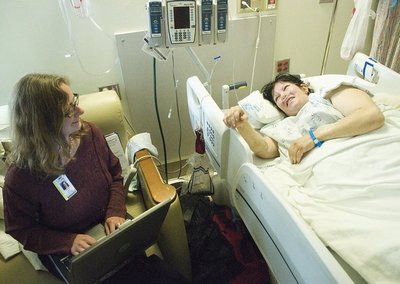July 22, 2010
Life narratives unfold with Harborview writer-in-residence
Seattle writer Wendy Call has been immersing herself in the topic of grief and loss — her own and others. From the beginning of June until last Friday, July 16, she was the writer-in-residence at Harborview Medical Center. There she helped patients navigate challenging medical conditions and end-of-life experiences through writing and storytelling.
“I’m interested in how people create meaning from their lives and how people create a coherent narrative from what seems to be a bunch of random events in their lives,” Call said.
“One of the things that’s struck me as I’ve been following around spiritual care and palliative care staff at Harborview is that over and over you see the patients and the patients’ family members trying to construct a narrative out of really bad luck. You see people going back and pulling out the details of a life to try to create some sense out of horrible things that have happened.”
Call said that people often turn to writing and storytelling when they are in grief or are enduring an upheaval in their lives.
One such person was Michelle Alfonso-Buske, a patient at Harborview since June 9. Alfonso-Buske struggles to come to terms with where she is in her life’s journey.
“One day, I woke up like this: I was paralyzed. Out of the blue. Now, I’m paralyzed from the waist down,” Alfonso-Buske said. “It hits me sometimes real hard; I know it’s going to shorten my life. I thought I was going to last a bit longer…I never envisioned being like this, not with what I’ve been through in this life.
“I signed up for palliative care. But, my No. 1 goal is to get home. If I’m going to die, let me die at home and not in pain.”
Alfonso-Buske’s husband Bob recalled the accident that changed his wife’s life.
“Michelle has osteoporosis and uses a little electric cart to ride around in the store. We were in the pharmacy department at a local retailer reading the backs of vitamin bottles. This gentleman had loaded a cart up full of cases of bottled water stacked so high he couldn’t see where he was going. He bumped the back of Michelle’s cart and all the cases of water started falling one at a time and peppered her from her head all the way down and knocked her all the way out. Ever since then, her bones were so bad anyway, that they just starting to dissolve from the osteoporosis she’s had over the years. She actually shrunk from 5’3″ to 4’10”. And, now her ribcage is sitting on her hips and it really bothers her. That’s how this all came about. It’s been a slow process. It’s been three and a half years and now we’re into this part of it now.”
Over the course of days and hours, Call heard many of Alfonso-Burke’s stories, some coherent, others not because of the confusion caused by the morphine she was given for pain. Stories of losing her dad; of riding horses in her youth; of going on a small-vessel cruise with her husband Bob Buske and swimming in the frigid waters of Admiralty Inlet; and of her home and horses in “God’s country”—Ravensdale, Wash.
Alfonso-Buske said Call was a wonderful and welcome presence during the long days and nights of her hospitalization. “Wendy is someone to talk to; she listens to me; she hears my frustrations and it’s helpful for me to get those out.
“Wendy’s a very giving person. And, she’s quiet when she needs to be. Wendy just sat there with her computer. There were times when you wouldn’t know she was there except I could hear the keyboard going.”
During the course of her residency, Call used the practice of just sitting and listening, one she deftly cultivated while caring for her mother, whom she lost to pancreatic cancer in 2007. She plans to include parts of some of the patient stories in a series of essays to be published in the future.
“If you spend time, you hear the person’s life narrative…and that’s a gift,” Call said.
“As my mother got sicker and life kind of slowed down more and more and more, one thing that was interesting to me was that it didn’t get boring, even repetitive tasks. There was something quite lovely about just sitting…with my mom…all day. When people choose to try and avoid the most poignant and sharp parts of grief by not spending time with people who are dying, they lose that gift.”
In addition to spending time with patients one on one, Call also met with patient support groups and with therapy groups andconducted writing workshops to help patients express themselves more fully as they worked to return to health. Her hope is that patients find healing power through expression of their own stories.
“I hope this will be useful to them in finding a way to figure out what their story is…and help them process complex and contradictory emotions.”
Call’s residency was supported by grants from 4Culture and the City of Seattle Office of Arts & Cultural Affairs.

